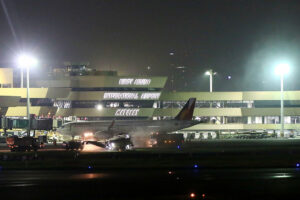THE Asian Development Bank (ADB) has recommended extending the bid submission deadline for the rehabilitation of the Ninoy Aquino International Airport (NAIA) until January next year.
In a document obtained by reporters, the bank said the proposal is meant to give potential bidders more time to prepare and submit their bids, which it said would result in “more competition and a better financial outcome for the Philippine government.”
“It would also provide concrete evidence of the government’s commitment to encourage new players, and foreign investment in Philippine public-private partnerships (PPP), without causing undue delay to NAIA’s modernization and the PPP program,” said ADB, the project’s transaction advisor.
To date, the Department of Transportation (DoTr) said NAIA’s rehabilitation had attracted eight potential bidders.
The department initially set the deadline for bid submission on Dec. 27. It earlier said that it expects to announce the winning bidder by the first quarter of 2024.
In November, it announced that a Turkish airport operator had joined seven other entities that have bought bidding documents for the project that will upgrade the Philippines’ main gateway.
The other potential bidders eyeing NAIA’s rehabilitation are Incheon International Airport Corp., San Miguel Holdings Corp., Manila International Airport Consortium, Cengiz Insaat Sanayi ve Ticaret A.S., GMR Airports International, Spark 888 Management, and Asia Airport Consortium.
Of the prospective bidders, four entities have requested an extension, the ADB said, adding that if the bid submission will not be extended only two entities can comply.
“Four including large, credible international airport operators with no prior investment in the Philippines have requested an extension,” it said.
It noted that the entities had asked for more time “to request and analyze additional information” from the Manila International Airport Authority and the DoTr.
It added that the entities also requested “to secure their internal corporate approvals, which will take longer in light of the upcoming holiday season.”
NAIA’s rehabilitation aims to decongest the airport by helping improve its annual passenger capacity to 62 million from the current 35 million.
The ADB warned that if the initial December deadline is retained, only two prospective bidders — largely big corporations — would be able to submit bids.
“They have both submitted unsolicited proposals for NAIA in the past and are thus significantly more familiar with NAIA than the other four prospective bidders,” ADB said.
It said that extending the bids would attract more bidders and would ensure a competitive avenue that may yield a better financial outcome for the government.
“The winning bidder would have bested robust competition from a larger number of bidders giving the public further assurance that the concession was awarded to the best possible bidder. It would also send a strong statement that the government is committed to ensuring a level playing field for all investors, now that recent reforms allow local and foreign investors to compete for NAIA on the same terms, without foreign ownership restrictions,” it said.
Separately, a representative from the DoTr said in a Viber message confirmed that some prospective bidders had requested an extension of the bid submission date.
However, the prequalifications, bids, and award committee or PBAC for the project has issued a bid bulletin indicating that the bid submission date remains on Dec. 27, 2023, the source added.
According to the NAIA-PPP concession agreement, the contract term for the project is 15 years, extendable by another 10 years. The project will be a rehabilitate-operate-expand-transfer arrangement, as provided for under the Build-Operate-and-Transfer Law.
NAIA’s rehabilitation aims to decongest the airport by helping improve its annual passenger capacity to 62 million from the current 35 million.
The winning bidder for the airport upgrade is required to pay an upfront amount of about P30 billion and an annual payment of P2 billion, plus a share of revenue, according to the draft concession agreement. — Ashley Erika O. Jose
